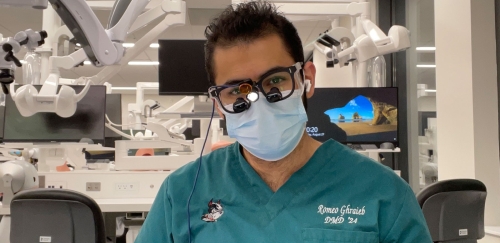
Alumni retrace their journey to medical practice. (Pictured, dental student Romeo Ghraieb ’20)
Rhode Island College gets a lot of well-deserved press for its outstanding nursing program, but many people don’t know that RIC is also a pipeline for future doctors.
Among our many alumni in graduate programs in medicine are: Romeo Ghraieb ’20, an up-and-coming D.M.D. (Doctor of Dental Medicine); Ben Litmanovich ’19, future M.D.; Meghan Gould ’19, graduating D.O. (Doctor of Osteopathic Medicine); and Daniel Thifault ’19, prospective Pharm.D. (Doctor of Pharmacy). (Though you probably don’t refer to your neighborhood pharmacist as “doc,” they are indeed doctors.)
One of the first questions these alumni were asked by their medical schools was “Why medicine?” Their responses were as varied as there are medical specialties.
Litmanovich is a Belarusian American whose mother and grandfather immigrated to the United States from the Soviet Union as refugees from the Chernobyl disaster. After working at a coffee shop for many years, his mother, Elena Litmanovich, managed to earn a degree in nursing at Rhode Island College in 1996.
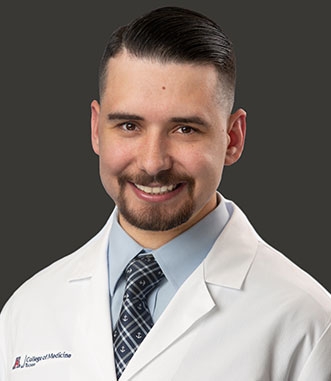
Likewise, Litmanovich pursued a nursing degree at RIC in 2012. At the same time, he enlisted in the U.S. Air Force Reserve/Rhode Island Air National Guard, where he served from 2012-2021.
“It was my mother who inspired me and helped shape my passion for ‘service before self,’” he says.
Litmanovich’s tours as an aerospace medical service technician included trainings in emergency rooms and ORs.
“I was impressed by how the trauma surgeon would get his team together to pull through a patient,” he says.
His employment as an emergency medical technician for an ambulance service in Massachusetts also impressed upon him. Ultimately, Litmanovich switched to a double major in biology and chemistry. He is attending the University of Arizona College of Medicine – Tucson, with the goal of becoming a critical care physician, researcher and health-care executive.
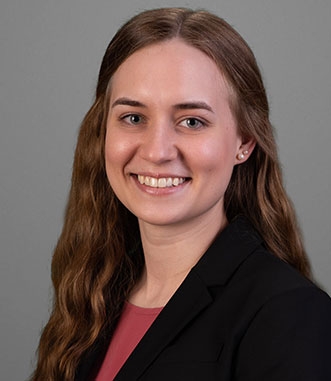
THE PATH
At RIC, the first step toward medical or dental school is through the Pre-Professional Advising and Evaluation Committee. (Prospective doctors of pharmacy do not go through the committee.) The committee consists of two biology faculty, two chemistry faculty and one additional faculty member from arts and sciences, who interview the candidates and review their medical or dental school application materials.
Based on the committee’s interview and the candidate’s reference letters, the chair of the committee, Professor Elaine Magyar, writes a composite letter of recommendation, which she sends to their prospective medical or dental schools.
Gould remembers spending many hours in Magyar’s office going through the process of applying to medical school. “I felt very supported,” says the chemistry major.
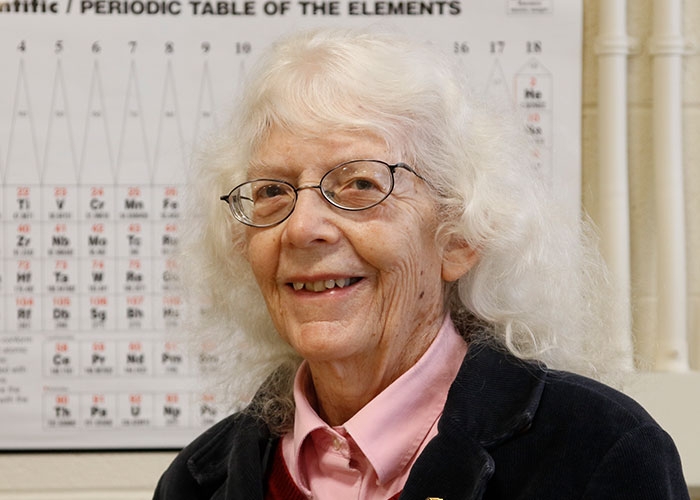
Magyar, who has sat on the committee for more than 30 years and who has been chief advisor for students for about that long, likens her role to that of a parent:
“You sit down with students each semester and talk about what courses they’re taking and how they’re doing in their courses. You’re nurturing them along, encouraging them and guiding them. And like a parent, sometimes you have to admonish them. Maybe they’re focusing too much on outside activities and need to focus on getting that good grade in that genetics course.”
“The greatest reward for me is knowing that Rhode Island College gave these students the opportunity to become physicians, dentists and pharmacists by providing them with a strong academic foundation,” she says. “They tell us the foundation they received here is equal to their peers who went to Ivy League schools.”
According to Thifault, a management major with a minor in chemistry, the academics at RIC were great. “I got involved in independent research in a biology lab that gave me a lot of hands-on experience with lab techniques that you might not see until you’re doing your first [pharmaceutical] internship at your first job,” he says.
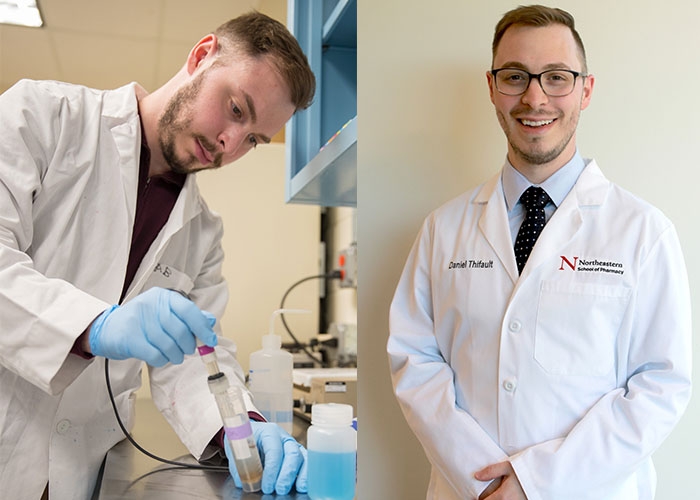
“A lot of people stress out because they’re not earning their undergraduate degree at some prestigious school, but RIC offers you a great foundation at an affordable price. Instead of being lost in a lecture hall with 500 students, you’re in a class with 10 other students and you’re able to make great connections with faculty. Having that one-on-one is invaluable,” Thifault says.
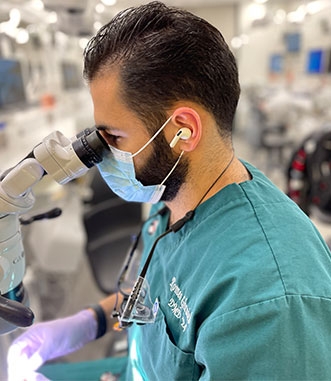
THE COST
RIC may be the highest quality and most affordable four-year public institution in Rhode Island but medical school is expensive – dental school even more so.
According to Ghraieb, who is attending the Boston University School of Dental Medicine, the cost of his education is about half a million dollars. Thanks to generous loans, he and his peers know that their school costs will be covered.
After completing their graduate program in medicine, these alumni will go through a medical residency. This is a period of training in a hospital or clinic that provides in-depth, hands-on practice in the individual’s specialized field of medicine. Successful completion gives them the license to practice medicine.
To become a doctor, you’re looking at about 10 to 12 years – four years in an undergraduate program, four years in medical school and three to seven years in a residency program. Some also do a fellowship program.
Gould went through an accelerated degree program. In June she completed her D.O. degree at the Lake Erie College of Osteopathic Medicine. Her residency takes place at the Warren Alpert Medical School of Brown University, and she’ll practice out of Kent Hospital.
“It’s hard to imagine that I’m going to be a real doctor, responsible for patients,” she says. “Even with all the knowledge I’ve gained, I still feel very young and nervous to have that responsibility.”
THE FORERUNNERS
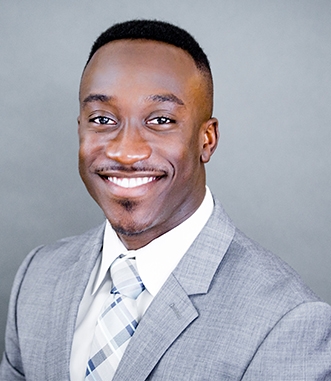
As Gould begins her residency at Brown, Dr. Emmanuel Asiedu ’15 is completing his at the same school. His specialty is internal medicine and he’s been practicing out of Rhode Island Hospital, The Miriam Hospital and the Providence VA Medical Center.
Asiedu understands Gould’s nervousness. “I think everyone is nervous once they realize that no one is looking over their orders or their clinical decision making anymore,” he says. “What’s great about medicine is that it’s very collaborative; we’re all working for a common goal. The help and resources are always there, even if you’re just reaching out to your colleagues.”
As Asiedu ends his three-year residency, he does so with distinction. Out of a class of 30, he and five other residents were selected chief residents based on high evaluations from patients and supervising doctors. A chief resident leads a group of resident doctors in a residency program. The position is offered once a resident has completed their residency program. Beginning next year, Asiedu, as chief resident, will perform administrative functions, attend to patients and teach junior residents clinical practice and procedures.
Both academically and athletically he excelled at Rhode Island College. He was a star soccer player and engaged in scientific research in Professor Emeritus Thomas Meedel’s biology lab. Asiedu applied to Brown’s medical school in his sophomore year through their Early Identification Program and was accepted a few months later.
Each year RIC faculty are able to nominate several students as candidates for the Early Identification Program. Students who are accepted into this competitive program and who successfully complete their undergraduate coursework can be accepted into Brown’s medical school upon graduation.
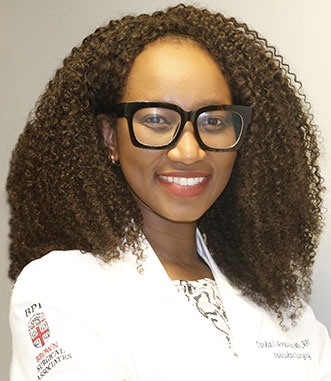
Like Asiedu, Dr. Carla Moreira ’03 also went through the Early Identification Program. After earning her M.D. at Brown’s medical school in 2008, she fulfilled her residency in general surgery at the University of Chicago in 2013, followed by a two-year fellowship training in vascular and endovascular surgery at the Boston Medical Center.
In 2015 Moreira joined the Department of Surgery at Brown University’s medical school, with attending privileges at Rhode Island Hospital, The Miriam Hospital, Women & Infants Hospital, Fatima Hospital and Roger Williams Hospital. She was also appointed chief of vascular and endovascular surgery at the Providence VA Medical Center in 2018. In addition to her busy clinical practice, Moreira established SURGE Lab in 2019 to research health disparities among marginalized groups.
THE MENTORS
Moreira is deeply committed to mentorship. In fact, she credits her own success to having had great mentors, which is why, when she received an email from premed student Sarah Ebirim ’22 asking for permission to shadow her in her OR and clinic, Moreira immediately said, “Yes.”
“It’s been such a blessing,” Ebirim says. “I got to sit in on her surgeries and I got hands-on experience in her clinic by being able to meet different patients. It was amazing to watch her at work.”
Because Ebirim’s interest is in neonatal surgery, which is surgery on the pregnant mother and her baby in utero, Moreira set it up so that Ebirim could also spend a week in the OR of Dr. Francois Luks, pediatric surgeon-in-chief at Rhode Island Hospital.
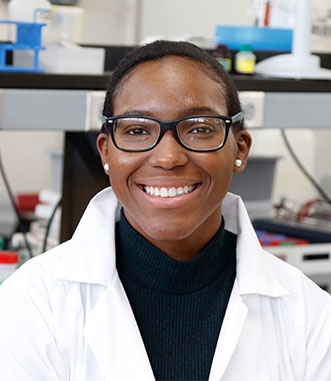
It was a real eye-opening experience, Ebirim says, particularly the case of spina bifida. Spina bifida occurs when a baby’s spinal cord fails to develop or close properly while in the womb. Surgery is done to close the defect.
“Rhode Island Hospital only gets about one case like that a year, yet I was somehow given this amazing opportunity to witness it,” she says. “The surgery itself was extremely intense. There were two anesthesiologists, one fetal surgeon, two pediatric fellows, two neurosurgeons and Dr. Luks himself.”
“First, they cut open the mother and then the neurosurgeons came in and operated on the child’s spinal cord. It was such an invasive procedure. Everything had to be timed perfectly. Dr. Luks said once we open the mother, we had 45 minutes to complete the surgery. The entire surgery took under an hour,” she says.
What excites Ebirim about medicine is that it is always changing. “We’re always learning something new and yet there are other things that happen miraculously that we’ll never be able to understand,” she says. “I’m fascinated with how life is created and how, on the nano scale, everything works to make up the human being.”
Imminent neonatal surgeon Ebirim takes her place among the next crop of future doctors educated at RIC, including Morgan Andrews ’22, future physician scientist; and Yenelsy Cepeda ’22, prospective physician anesthesiologist.
Reflecting on the past 30-plus years, Magyar concludes that all of the students who passed through RIC’s pipeline are success stories.
“Some students came in at the top of their high school class and just flew through their RIC program,” she says. “We’ve also had a number of students who came in and really needed the nurturing that Rhode Island College provides. I think it’s most rewarding to see the latter become doctors because they’ve succeeded way beyond their expectations – maybe not beyond their dreams but certainly beyond their expectations and other people’s expectations for them. Yes, for me, they’re all success stories.”
